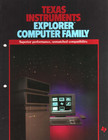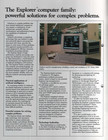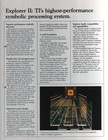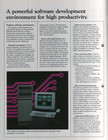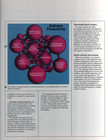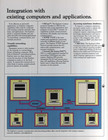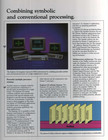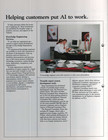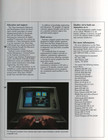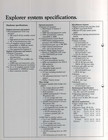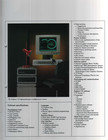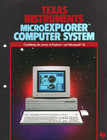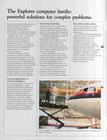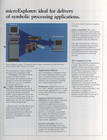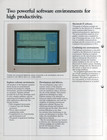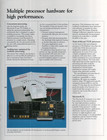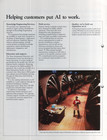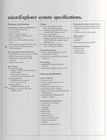October 31, 2002
CLiki Slides
Dan Barlow's CLiki paper and slides from the ILC are available.
Hopefully more material from the conference will be put online soon.
[lemonodor] dan_b, tell us the news from our cultural leaders. [dan_b] rpg says we've got it all wrong [dan_b] rms says we should all write free software [dan_b] kent says rms is destroying his way of life [dan_b] business as usual, really
October 30, 2002
MCL 5.0 in January
There's nothing about it on the Digitool web site yet, but at his ILC talk yesterday Stephen Hain announced some MCL 5.0 details. Mark Stickel sent a note to info-mcl with the information:
MCL 5.0 will be available in January 2003. Commercial version price is $750. Discounts for students and educators. Includes one year of support. Beta version will be available in November 2002. Price is $495. Includes free upgrade to final version in January.
Looks like a significant change in the Digitool pricing (4.3.1 used to be $375), and the beta gets you quite a discount.
October 28, 2002
CLIM Reversi
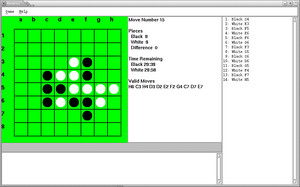
Kevin Rosenberg wrote a version of Reversi that includes a CLIM interface. It seems like the perfect thing to take a look at if you were wondering how to write programs using CLIM.
October 25, 2002
Going Deaf 2% at a Time
Good news, everybody. 48 hours after the Prong show, my tinnitus is 98% gone.
Lisp in Space
A couple months ago Erann Gat finished his personal history of lisp and other languages at JPL and Google (which may be a revised version of a previously noted usenet article).
It's a somewhat tragic story that I find worth reading because
- It's a short insider's look at the sequence of robots that eventually culminated in the Mars Pathfinder rover.
- It sketches a not implausible case that but for some unfortunate politics, the Mars Pathfinder rover would have been running lisp instead of C.
- It mentions my old boss.
- It mentions the origins of OpenMCL.
On the one hand, JPL has had some big successes since dumping Lisp. On the other, maybe they could have done much more if they hadn't been using languages that make software development almost uniquely difficult and slow. Even another ex-JPLer I know who thinks C++ is too far from the hardware says that JPL projects go sloooooowly.
October 24, 2002
I Would Argue Like This
Language advocacy is usually (but not always) pretty boring to me. But this message from Richard Gabriel, who to me remains inscrutably smart, is just plain fun. No holds barred, man.
Though it's not relevant, I would argue like this:
My team will be able to program circles around everyone else. They will be able to construct rapidly a language specific to the problem we are solving rather than using a language designed by computer scientists worrying about their place in history and a herd of library writers working in cubicles a thousand miles from our business. My team will be able to use a language without training wheels. Strong typing is for weak minds, and it's exactly like they say at MIT: Our current popular languages are designed to help losers lose less.
I will be able to point to various examples where Lisp programmers have written not only 3-5 times faster, but they wrote things other programmers thought were impossible. In this regard, I'd tell the CEO, our competitors will be spending all their time trying to figure out that it's really possible we're doing what we're doing, because they will be thinking in terms of customization at compile time or link time, not at runtime.
Moreover, we will be operating where the CEO is focusing on his or her specialty and not imposing his or her knuckleheaded view on technology.
Because Lisp is dead, I'll get better programmers for less money. I'll be able to guarantee 50 more IQ points for the same pay. And my guys will be able to spend their time typing in value not book keeping overhead and typing in type descriptions because their guys are too stupid to know when they type + numbers are involved.
Because no one uses Lisp, I'll have my pick of thousands of great, experienced programmers looking to work for someone with a non-zero IQ, not the ones fresh out of college with 10 programs under their belts.
I'll be compatible with everything because it is right now. And if someone throws me a bug, I can code around it in a few minutes. Being a niche market means we're more proprietary. People will not use Lisp to compete with us because they are lamebrains listening to the latest fashion statement from Sun or Microsoft.The open source crowd isn't even smart enough to notice C++, so they are especially nowhere in the picture.
Of course, no CEO will belive this because every one of them is stupid.
-rpg-
October 23, 2002
Assassin
I'm really not a comics sort of guy--I've read about ten issues of anything ever. But seven of those were Elektra: Assassin, which had a gritty and surreal, though touching, story. It also had amazing art by Bill Sienkiewicz. The series has been stuck in my mind for over a decade.
jwz has links to some of Bill Sienkiewicz' artwork, both from Elektra and other projects.
MCL 5.0 Announcment
From the announce-mcl mailing list:
Digitool will be making an announcement about MCL 5.0 for
Mac OSX at the International Lisp Conference 2002 in San
Francisco (October 27-31):
http://www.international-lisp-conference.org/
Steve Hain will be presenting there a paper on "The
HotDispatch Web Site, a Lisp Success Story"
See you in San Francisco and thank you for supporting MCL.
--
Jennifer Jones
Digitool, Inc.
Ooh, some old-tyme conference excitement!
Prong

I saw Prong last night at the Keyclub. Man was that fun.
October 22, 2002
TI Explorer Family
It's time for another TI explorer lisp machine brochure, courtesy of Rainer Joswig:
This is the second part in our series about the Texas Instruments Explorer Lisp Machines. This brochure describes the Explorer Computer family and covers the 'Explorer', the 'Explorer II' and the 'Explorer LX'. The latter is a Lisp Machine with an additional Motorola 68020 on a NuBus board running System V Unix. So the Lisp system is the host for a Unix system. Those were the days.
Again, these TI Explorer Lisp machines are hard to find. It seems that a swiss airline bought most of the remaining working systems, because they use them as part of a larger airline reservation system. Still today.
October 21, 2002
MCL OS X Delay
Gary Byers posted a message to info-mcl with an insightful overview of some of the issues that could be responsible for length of time it's taking to create an OS X-native version of MCL.
MCL relies - at a fairly deep, fundamental level - on low-level OS services (mostly, the ability to handle exceptions that occur during its own execution and the ability to control the protection of its own memory pages.) These OS services are provided by most (if not all) mainstream general-purpose OSes (including MacOS [789X]), though the details and level of support differ. I think that it's fair to say that the vast majority of Macintosh C[++] programs don't use these facilities or don't push them very hard; MCL pushes them very hard ...
...
To return to the near-present: as recently as December 2000, Apple didn't provide support for the MacOS Exception Manager in Carbon. As I understand it, some (presumably rather shrill) protests from Alice were a signigicant factor in persuading Apple to correct this oversight. If I understand and recall correcty, support for the Exception Manager in Carbon made it into MacOS X as of version 10.1 (September or October 2001.)
I believe (from having spent a few days stepping through machine code in GDB) that there are some serious bugs in the OSX Carbon implementation of the Exception Manager; once I understood the issues, I was able to write small, self-contained C programs that demonstrate the problems, and filed bug reports with Apple. That was a few months ago; I still hope to hear back from them, but haven't so far.
MCL pushes pretty hard on the exception handling primitives that the OS provides; the OSX Carbon Exception Manager falls over in a strong breeze, and if Apple's interested in fixing it they don't seem to have communicated that interest too well.
Corman Lisp 2.0
Corman Lisp 2.0 is out [via Chris Double].
This is a major new release, with a lot of bug fixes and new features, much of it related to threading. The biggest addition is the ability to create DLLs.
Also, this is interesting:
As well, we have notified the J13 Common Lisp standards committee of our intent to become a voting member. We hope to contribute to the advancement of the standard, in particular to standardizing threads, sockets, and other areas we feel the standard is significantly missing. With the addition of Corman Technologies, we have been told by a committee representative from Franz that there will be enough voting members to move the standard along.
October 19, 2002
MCL Callbacks
This is pretty obscure, but it comes up every couple years on the MCL mailing list, and the archives of that list are spotty so it's information that's difficult to dig up if you're faced with this problem.
In MCL, you can define a function that can be used as a callback from C using defccallable. But that doesn't work for all APIs expecting callbacks, especially in the more "modern" APIs (QuickDraw 3D, QuickDraw GX, er, which are both obsolete. anyway.). In that case, you want something like this:
(defun callback-pointer (fn-ptr)
"Turns a \"defccallable\" function pointer into one that C can call."
(ccl:pref (ccl:pref fn-ptr :RoutineDescriptor.RoutineRecords)
:RoutineRecord.ProcDescriptor))
October 14, 2002
Vowell Interview
This is a pretty good interview with Sarah Vowell. And an even less flattering photograph than the nosetip one.
TI microExplorer
Rainer Joswig has a collection of promotional brochures for lisp products from the days of yore. I'll be posting his scans periodically.
Now, here's Rainer:
So it is time for some heart warming memories, now that the cold winter days are coming. We start publishing a series of Lisp memorabilia from before the "dark ages". First there will be some information about the TI Explorer Lisp machines. Little information about those is available on the Internet - compared to the more popular Symbolics Lisp machines.
The first brochure is about Texas Instrument's "microExplorer Computer System", a combination of an Apple Macintosh II and a Lisp processor on a NuBus card. Actually Texas Instruments used the NuBus first on their Lisp machine series before Apple introduced it with the Macintosh II.
The heart of the microExplorer is a 32 Bit Lisp microprocessor that runs an operating system written in Lisp. The software did support ZetaLisp, Common Lisp, Zmacs (an Emacs-like editor) and much more.
Btw., used microExplorers are extremely hard to find.
October 12, 2002
Intolerable
A comment was posted yesterday by x l i b r i s (no googling for you bastards) that was commerical spam. It was annihilated, as any future comments of that nature will be.
October 10, 2002
MCL 4.3.5 Available
MCL 4.3.5 is now available from Digitool. It is Carbon-based, and appears to be an interim version before the fully OS X native 4.4. This is great news.
In a message on the info-mcl mailing list, Stephen Hain mentions the following new features:
- New Carbon-compatible interfaces
- New ".cfsl" file extension for Carbon-compatible compiled files
- Dozens of bug fixes to core code, user interfaces, OpenTransport, the compiler, and example files
- Many enhancements to Fred, user interfaces, streams, Quickdraw interface, ANSI compatibility, etc.
4.3.5 will be available to those who purchased 4.3.1, and anyone with a current MCL subscription. People who fall into either category will be contacted personally by Digitool with instructions on how to download 4.3.5. I can't wait!
Stephen also says that progress on the Mac OS X native version of MCL is good.
October 09, 2002
ACL 6.2 Patched for OS X 10.2
Andrew Farrell points out that Franz has released patches to fix the problems ACL 6.2 had with OS X 10.2.
Parable
"LISP would have spoken, but it had caught a glimpse of itself in the pond and fell in when it tried to meet itself coming." heh.
October 08, 2002
Blowing It Big

The guy on the left in the above photo is Jan Hendrik Schön, a 32 year-old solid state physics prodigy. Until just recently he was a researcher at Bell labs, where last year he published a paper on average every 8 days.
The current issue of Science has an article that quotes some of his colleagues:
"He rediscovered everything in condensed matter physics in the last 60 years in organic materials."
"It would be a monthly demonstration of how stupid you are. He was creating a new field every 2 months."
Then it all fell apart. Now he'll be remembered as the perpetrator of the "most extensive case of scientific misconduct in modern history."
I have to admit that part of the reason I find this story interesting is that Schön is my age, and I cannot help but narcissistically try to compare my life with my idea of what a once-wunderkind now-pariah's life is like, and wonder about what sorts of pressures motivated him to do what he did. Also, I'm drawn to failure of various kinds. Which is part of why I find Richard Gabriel fascinating--I think about some of the autobiographical parts of his Patterns of Software and the failures they describe regularly.
October 07, 2002
Lisp Done With
The ICFP winners have been announced, and none of the lisp teams won.
I guess that means it's time for Lisp to pack it in, eh?
October 03, 2002
Codemist Common Lisp
I posted something earlier pointing to Dan Moniz's mention of the freely available Codemist Common Lisp compiler. Only apparently I didn't click-click on "Save", because I don't see it anywhere. Luckily Chris Double's post reminded me of it.
I've never heard of the Codemist compiler, and it comes with no documentation. Whee.
Tell us what you know, Dan.
October 02, 2002
Abuse
In the history of computer games, there may be only one whose retail packaging boasted that it contained the power of LISP [via Mutiny on #infoanarchy].
It's Abuse, of course.
ER1 For Sale
Yesterday Evolution officially announced ER1's arrival in retail outlets.

One interesting thing about ER1 is that it went from prototype to sitting on CompUSA shelves in about four months.
Robots.net has a blurb.


